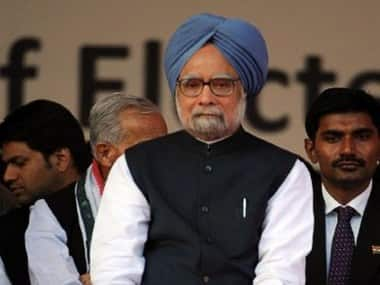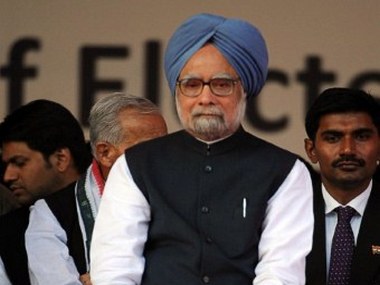It’s a fair bet that many of us don’t get to see and experience abject poverty and malnutrition up-close beyond the beggar girl at the traffic light with her kwashiorkor-distended belly who taps on the taxi windscreen before she is shooed away by the driver.
We’ve become so inured to the sight of slums and squalid living quarters in our urban spaces that we no longer even notice them anymore. With unseeing eyes, we’ve consigned them to the suburbs of our minds, pushing out to the periphery that which doesn’t appear in our field of vision.
So, we doubtless feel a pang of guilt when we’re reminded, as Prime Minister Manmohan Singh forcefully did today , that the level of malnutrition among Indian children remains “unacceptably high” and that 42 percent of our children are still underweight.
[caption id=“attachment_177981” align=“alignleft” width=“380” caption=“The Food Security Bill isn’t about food security. AFP”]
 [/caption]
[/caption]
Hold on to that emotion - because that is a very legitimate response to the shame that we ought to feel as a nation. If we had an iota of empathy, those of us who skip a meal only out of a sense of calorie consciousness or for observing religious self-purification rituals would feel the pangs of the millions who go hungry because they cannot afford a meal.
But also, hang on to that same emotion, because that’s precisely what Manmohan Singh and his UPA government want to milk for what it’s worth - so that they can achieve by guilt-tripping you what they cannot ever with the power of reason.
For all the insight that they offer into a slice of India that lives on the edge of starvation, the statistics relating to the “national shame” that Manmohan Singh cites are just numerical devices to hijack the social agenda with ill-conceived and populist welfare schemes that have come in for justifiable criticism.
There is no better way to silence critics of the Food Security Bill, for instance, than by citing these statistics, and insinuate - as some commentators have done - that anyone who opposes the bill is heartless, lacking in empathy and really wants to see malnourished children die.
As Firstpost has argued here , the Food Security Bill isn’t about food security: that objective can be better achieved by creating jobs and raising incomes, ensuring higher food output by raising agricultural productivity, and providing a food safety net for those who fall through the cracks.
If millions of Indian children are still malnourished, if many millions more live in abject poverty, it is a commentary on the poverty of policy-making in India in the 60-plus years since independence. It’s not that taxpayers’ money has not been spent over the decades on poverty alleviation measures and providing subsidised food: it’s that throwing money around has become a substitute for effective policy that works.
It is a perversion that India, which has more per-capita arable land than China and produces as much grains and milk as the world’s biggest farming nations, is still home to the world’s largest population of malnourished people.
Right from the time of Jawaharlal Nehru, who in 1947 called for “the ending of poverty and ignorance and disease and inequality of opportunity”, every Five Year Plan has paid token lip service to the poor and the marginalised, yet their absolute numbers have only increased over the years. Instead of informed policy, the poor were given political slogans: garibi hatao - and a limitless array of schemes named after dead Congress leaders.
The famed economist Dr Raja Chelliah, whom Manmohan Singh was fond of quoting in the 1990s, noted that India’s continuing poverty was the result of a failure of public policy.
He argued that the major fault of India’s economic policy was that it was largely based on “democratic socialist thought” - which invested the government with the greatest responsibilities but without the appropriate policy mechanisms to respond to the challenges.
Dr Chelliah also faulted politicians who gave in to “competitive populism” and focused on short-term political gains instead of long-term poverty alleviation programmes. It’s a fair bet that were he alive today, he would have had much to say about the Manmohan Singh government’s record of throwing good money into flawed welfare programmes that won’t deliver.
So, Mr Prime Minister, thank you for reminding us of the “national shame” that these statistics represent. We, as a nation, do feel sufficiently humbled and are wracked by guilt.
But what about you, Mr Prime Minister. As someone who has either had oversight over (or influenced or implemented) economic policy-making for decades, including in the last seven years as prime minister, do you share that shame?
And what do you plan to do about it, beyond guilt-tripping us into coughing up more taxes while your government pushes through with extravagant welfare schemes that won’t address the problem but will only bust the bank?
Venky Vembu attained his first Fifteen Minutes of Fame in 1984, on the threshold of his career, when paparazzi pictures of him with Maneka Gandhi were splashed in the world media under the mischievous tag ‘International Affairs’. But that’s a story he’s saving up for his memoirs… Over 25 years, Venky worked in The Indian Express, Frontline newsmagazine, Outlook Money and DNA, before joining FirstPost ahead of its launch. Additionally, he has been published, at various times, in, among other publications, The Times of India, Hindustan Times, Outlook, and Outlook Traveller.
)